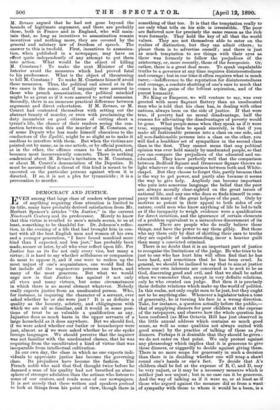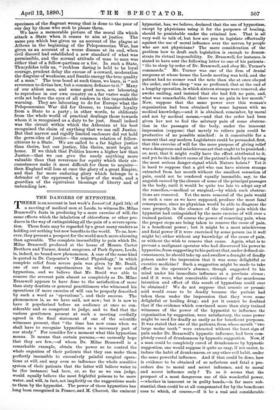DEMOCRACY AND JUSTICE.
EYEN among that large class of readers whose perusal of anything requiring close attention is limited to its title, many have probably derived satisfaction from Mr. Herbert Spencer's articles "On Justice," in the current ,Ifineteenth Century and its predecessor. Merely to know that this virtue is recalled to men's minds seems, to us at least, something to be thankful for. Dr. Johnson's reflec- tion, in the evening of a life that had brought him in con- tact with all the best English men and women of his own and a younger generation, "I have found mankind more kind than I expected, and less just," has probably been made, sooner or later, by all who ever reflect upon life. For Justice has as its foe not only every vice, but many a virtue; it is hard to say whether selfishness or compassion do most to oppose it, and if one were to reckon up the most unjust of one's acquaintance, one would find the list include all the ungenerous persons one knew, and many of the most generous. But what we would urge now is that Justice has against it not only all vices and many virtues, but some circumstances in which there is no moral element whatever. Nobody really expects justice from an uneducated person. Who, for instance, in inquiring the character of a servant, ever asked whether he or she were just ? It is as definite a quality as the honesty, sobriety, and obligingness with which we are all so familiar, and it would in some posi- tions of trust be as valuable a qualification as any. Injustice does as much harm in the upper servants of a large household as it does anywhere. But we should feel, if we were asked whether our butler or housekeeper were just, almost as if we were asked whether he or she spoke foreign languages. We should perceive that the inquirer was not familiar with the uneducated classes, that he was requiring from the uncultivated a kind of virtue that was inseparable from intellectual cultivation.
In our own day, the class in which no one expects indi- viduals to appreciate justice has become the governing class. Its prejudices have become the fashion. The French noble who said that God thought twice before he damned a man of his quality had not breathed an atmo- sphere of stronger adulation than the artisan who listens to some of our orators, and reads some of our newspapers. It is not merely that these writers and speakers pretend to look at things from his point of view, though there is something of that too. It is that the temptation really to see only what tells on his side is irresistible. The poor are flattered now for precisely the same reason as the rich were formerly. They hold the key of all that the world values. They are not themselves able to enter on the realms of distinction, but they can admit others ; to please them is to advertise oneself ; and there is just as much temptation to see things with their eyes as there was formerly to follow the prejudices of the aristocracy, or, more recently, those of the bourgeoisie. Or, rather, there is a great deal more. To speak unpalatable truths to a governor at any time requires disinterestedness and courage; but in our time it often requires what is much rarer,—indifference to the reputation for disinterestedness and courage, a resolute shutting of one's ears to much that comes in the guise of the loftiest aspiration, and of the purest humanity.
No King or Emperor, we will venture to say, was ever greeted with more flagrant flattery than an uneducated man who is told that his class has, in dealing with other nations, always been on the side of justice. If that were true, if poverty had no moral disadvantage, half the reasons for alleviating the disadvantages of poverty would be gone. What people mean when they speak as if it were true, supposing them to speak sincerely, is that if you make all fashionable persons into a class on one side, and all non-fashionable persons into a class on the other, you will find a healthier set of sympathies in the second class than in the first. They cannot mean that any political opinion was ever held mainly by uneducated people, so that you can compare the prejudices of the educated and un- educated. They know perfectly well that the comparison between Bedford Square and Grosvenor Square throws no light whatever on the comparison between both and White- chapel. But they choose to forget this, partly because that is the way to get power, and partly also because it seems the way to give help. Anybody can become important who puts into sonorous language the belief that the poor are always morally clear-sighted on the great issues of national life, and any one who does so finds himself in com- pany with many of the great helpers of the past. Only by motives so potent in their appeal to both sides of our nature, could men who know anything of life be led to talk as if the incapacity to weigh evidence were a qualification for direct intuition, and the ignorance of certain elements of a problem equivalent to a miraculous discernment of its answer. There are people who do really believe these things, and have the power to say them glibly. But those who say them only by dint of shutting their ears to truths they are capable of understanding, incur a heavier guilt than many a convicted criminal.
There is no doubt that it is an important part of justice to recognise the limitations of the judge. He -who tries to be just to one who has hurt him will often find that he has been hard, and sometimes that he has been cruel. In general, we should be inclined to say that to aim at justice where our own interests are concerned is to seek to be as God, discerning good and evil, and that we shall be safest when we remember that, except in very definite relations, only he who created can judge. But then it is precisely these definite relations which make up the world of politics. In this realm, not only ought men to be just, but they ought not to be anything else. Whenever a legislator takes a tone of generosity, he is turning his face in a wrong direction. Take, for instance, a question actually before the public,— that of supplying dinners for poor children at the expense of the ratepayers, and observe how the whole question has been confused (as Miss Octavia Hill has just observed in the little annual address which contains so much good sense, as well as some qualities not always united with good sense) by the practice of talking of these as free dinners. Perhaps it is desirable that they should be given : we do not enter on that point. We only protest against any phraseology which implies that it is generous to give these dinners, or niggardly to decide against giving them.
There is no more scope for generosity in such a decision than there is in deciding whether one will wrap a shawl round one's hands or one's feet. To decide that A's children shall be fed at the expense of B, C, and D, may- be very unjust, or it may be a necessary measure which is neither just nor unjust ; but in no case can it be generous. And the way of talking as if it were so, or at least as if those who argued against the measure did so from a want of sympathy with those to whom it would be a boon, is .a • specimen of the flagrant wrong that is done to the poor of our day by those who seek to please them. We have a memorable picture of the moral ills which attack a State when it ceases to aim at justice. The same pen which has given us an account of the plague at Athens in the beginning of the Peloponnesian War, has given us an account of a worse disease at its end, when civil discord had established a new standard of what was permissible, and the normal attitude of man to man was either that of a fellow-partisan or a foe. In such a State, Thucydides tells us, "reckless daring is held to be loyal courage, prudent delay the excuse of a coward, moderation the disguise of weakness, and frantic energy the true quality of a man." The true bond at such times, we learn, is "not reverence to divine law, but a common defiance to it." Many of our ablest men, and some good men, are labouring to reproduce in our own country on a far vaster scale the evils set before the eyes of all readers in this imperishable warning. They are labouring to do for Europe what the Peloponnesian War did for Greece, to transfer loyalty from a State to a party ; in other words, to obliterate from the whole world of practical dealings those towards whom it is recognised as a duty to be just. Small indeed was the circuit within which the Athenian at his best recognised the claim of anything that we can call Justice. But that narrow and rigidly limited enclosure did vet hold the germ-idea of justice—the common relation of fellow- citizens to a State. We are called to a far higher justice than theirs, but our justice, like theirs, must begin at home. If we think that Politics knows a higher law than Justice—that we can give the needy anything more valuable than that reverence for equity which their cir- cumstances make it most difficult for them to acquire— then England will lose at once the glory of a great Empire, and that far more enduring glory which belongs to a defender of the oppressed, a helper of the weak, and a guardian of the equivalent blessings of liberty and of unbending law.



































 Previous page
Previous page